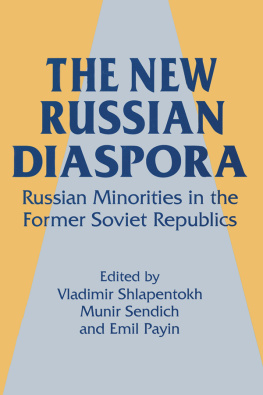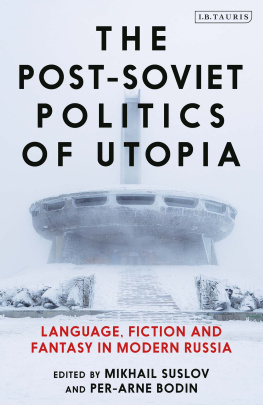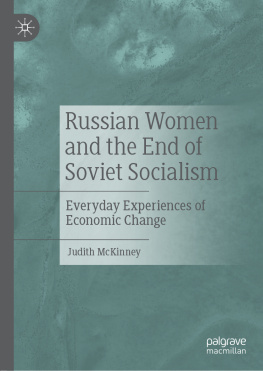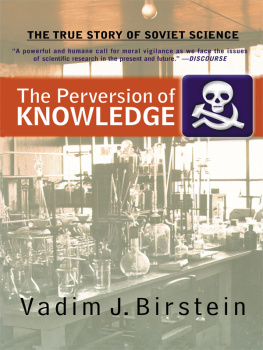First published 1996 by Westview Press, Inc.
Published 2019 by Routledge
52 Vanderbilt Avenue, New York, NY 10017
2 Park Square, Milton Park, Abingdon, Oxon OX14 4RN
Routledge is an imprint of the Taylor & Francis Group, an informa business
Copyright 1996 Taylor & Francis
All rights reserved. No part of this book may be reprinted or reproduced or utilised in any form or by any electronic, mechanical, or other means, now known or hereafter invented, including photocopying and recording, or in any information storage or retrieval system, without permission in writing from the publishers.
Notice:
Product or corporate names may be trademarks or registered trademarks, and are used only for identification and explanation without intent to infringe.
Library of Congress Cataloging-in-Publication Data
Present imperfect : stories by Russian women / edited by Ayesha Kagal and Natasha Perova ; introduction by Helena Goscilo.
p. cm.
"A slightly different version first published as 'Conscience deluded' in India in 1994 by Kali for Women"-CIP pref.
ISBN 0-8133-2675-3.ISBN 0-8133-2676-1
1. Short stories, RussianWomen authorsTranslations into English. 2. Russian fiction20th centuryTranslations into English. I. Kagal, Ayesha. II. Perova, Nataliia. III. Goscilo, Helena, 1945- .
891.73'01089287dc20
96-3383
CIP
ISBN 13: 978-0-367-28417-6 (hbk)
HELENA GOSCILO
UNTIL THE 1980s, Russian women's fiction often lacked bite: It tended to settle for politically safe themes, unmemorable character portrayal, plotlines that neither intrigued nor challenged the reader, and a rather flaccid style of fatigued realism. With a few memorable exceptions, such as Natalya Baranskaya's A Day Like Any Other (1969), I. Grekova's "Ladies Hairdresser" (1963), Galina Scherbakova's "Wall" (1979), and several mildly ironic stories by Viktoria Tokareva, that fiction coasted along largely unnoticed. Its docility paralleled women's tacit accommodation with their unacknowledged status as second-class citizens in a society falsely advertising itself as gender-democratic.
Contrary to George Orwell's dire prediction, the eighties brought not only perestroka but also several remarkable individual female talents in addition to a post-Stalin generation of young women writers whose sense of self and text clearly signaled a new sensibility. Tatyana Tolstaya made her stunning debut in 1983 with "'On the Golden Porch...,'" and subsequently published a series of playfully profound stories unequaled in their dense verbal texture, lushly poetic style, and tantalizing shifts in viewpoint. The receptivity of Russian culture to physiology during and after glasnost (what Russians call chernukha, roughly translated as "grime and slime") assured Petrushevskaya's stark portrayal of life's underbelly a ready, if sometimes uncomfortable, audience. Toward the close of the decade, Ludmilla Ulitskaya finally broke into print with her marvelously insightful, fine-tuned portraits of small and adolescent girls, young, middle-aged, and old women, often projected against a background of historical turmoil or social oppression. Ulitskaya's clarity of vision and strong command of language sounded a genuinely fresh note in her affectionate depiction of Jewish life and frank but unsensationalist exploration of sexual impulses in all their manifestations. Although at first glance Ulitskaya's stories resemble Petrushevskaya's in their gynocentrism and taboo-breaking, on closer inspection, their unshakable faith in the significance and effectiveness of ethical behavior contrasts with Petrushevskaya's bleak conviction that people are fundamentally maimed and isolated in an alienated world.
As the Soviet Union crumbled, in an unprecedented publishing venture, Larisa Vaneeva and Svetlana Vasilenko compiled and saw through publication two anthologies of New Women's Writing: The Woman Who Remembers No Evil (1990) and The New Amazons (1991). Russian critics' shocked response to the contents, which included works by Vaneeva, Vasilenko, Nina Sadur, Irina Polyanskaya, Marina Palei, Valeria Narbikova, and Elena Tarasova, left no doubt that these narratives violated stale Soviet preconceptions of what is permissible or desirable in women's writing. Disapproval focused above all on what critics called the "unnecessary" explicitness of physical details and on the "unladylike" behavior of the female protagonists. Indeed, both volumes not only enthusiastically embrace a "disobedient," transgressive concept of female creativity, but, for the first time in contemporary Russia, programmatically assert their status as specifically women's texts.
What apparently escaped affronted critics' notice was the thematic and stylistic diversity, vital imagination, and verbal boldness that mark many of the narratives. Not only do the selections bear the distinctive imprint of each author's voice but their aesthetic and emotional impact makes earlier women's fiction seem rather generic and timorously pallid by comparison. In that respect the entries in Present Imperfect both mirror and overlap with the two Russian anthologies, which also contain stories by Vasilenko, Palei, Polyanskaya, and Nina Sadur. As four of the most original practitioners of New Women's Prosethat is to say, narratives by the post-Stalinist generation that unhesitatingly transgress against Russia's inbred Victorianism about bodily mattersthat quartet would inevitably be included by anyone assembling a volume of current Russian women's fiction. Together with the other authors here, they provide a reliable index of the range, depth, and richness of that segment of Russian cultural production today.
The late Lydia Ginzburg, like Ksenia Klimova, stands somewhat apart from the rest, both by virtue of her profession (she made her living as a critic) and the nature of her text. "Conscience Deluded" is characteristic of Ginzburg's manner in that its location on the border between fictional narrative and philosophical essay exemplifies the problem of categorizing her writing according to genre. In its meticulous dissection of multiple levels of moral psychology, this meditation on filial guilt, self-delusion, and the infinite complexity of our inner censoring mechanisms recalls Ginzburg's evocative recreations of the Leningrad blockade as well as some of her up-close cultural analyses. As "Conscience Deluded" illustrates, it would be an exaggeration to claim that gender is even a peripheral issue for Ginzburg, whose concerns accord completely with High Culture masculinist preoccupations. Indeed, the figure of the remorseful but. dithering son from the intelligentsia whose stunted sentiments retract almost completely in his father's hour of need stands at the heart of Andrey Bitov's fiction, with which Ginzburg's narrative has appreciably more in common than it has with the other selections in this volume. Thus the value of Ginzburg's narrative in this anthology is that of Otherness; notwithstanding her renowned mentoring of young Leningrad/Petersburg female poets, Ginzburg as author of "Conscience Deluded" represents, in a sense, what New Women's Prose both implicitly and explicitly defined itself against. Above all, the rigorous exclusion of all sensuality and sexuality in a text that deals with the gradual extinction of the human body underscores the peculiar sexlessness of Ginzburg's perspective on life, as if her public solution to her lesbianism demanded a denial or a radical marginalization of all libidinous appetite. "Conscience Deluded" may best be read, perhaps, as a contrast to the other selections in the anthology.










